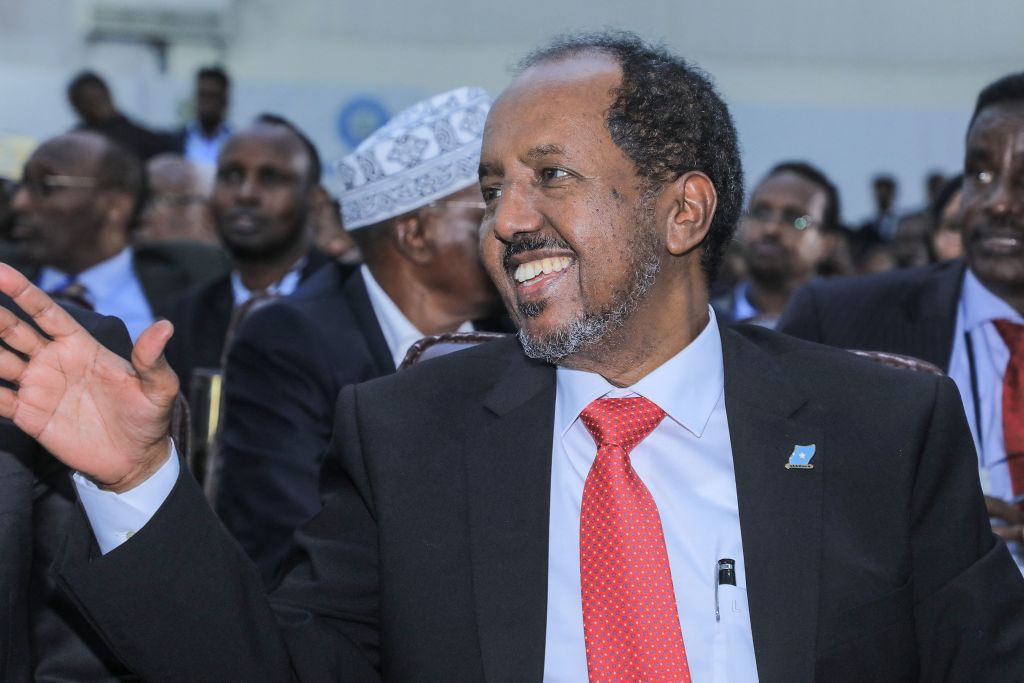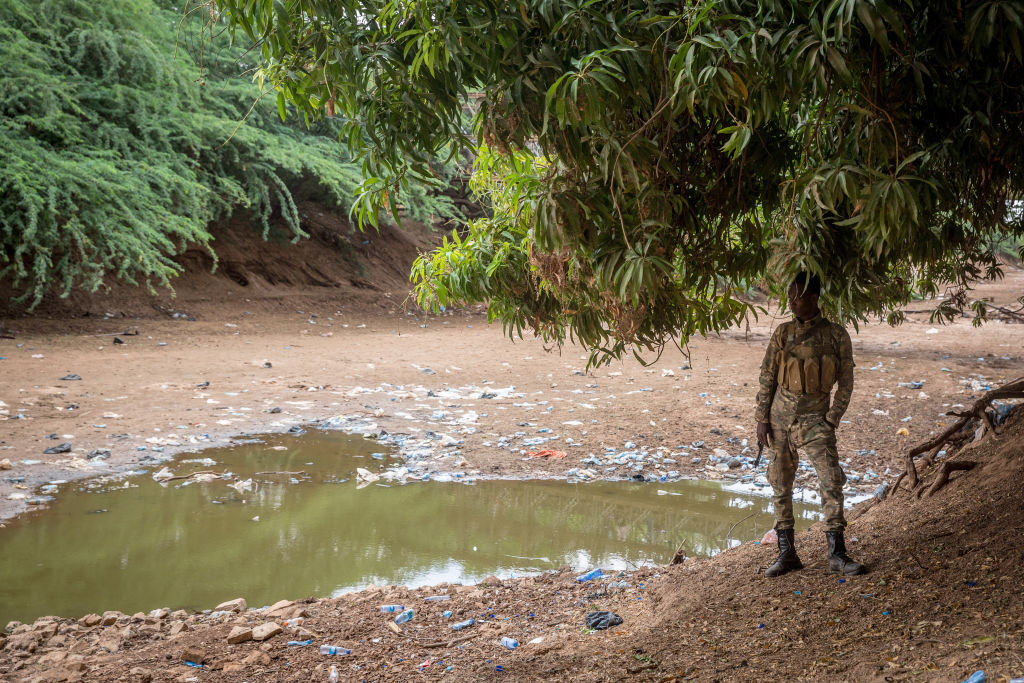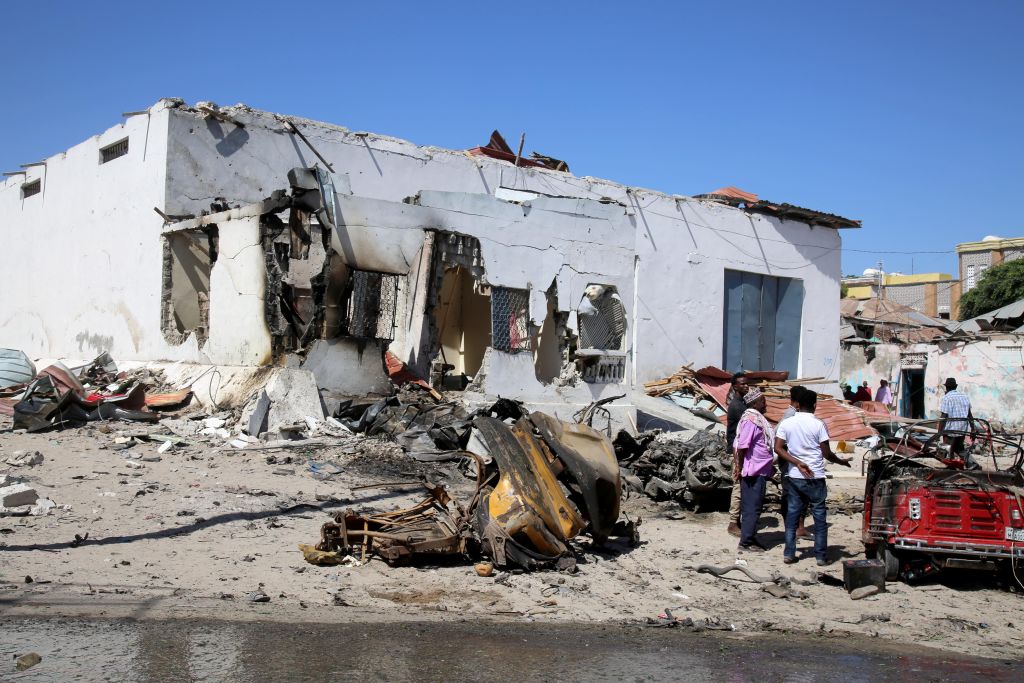
Somalia’s former leader Hassan Sheikh Mohamud was elected president on Sunday after receiving 214 votes from legislators in a poll open only to parliamentarians. But many hope the vote will end a political crisis that has lasted more than a year, when then-President Mohamed Abudallahi’s term ended in February 2021 without an election.
Mohamud, 66, a former university professor and aid worker who was previously in office from 2012 to 2017, was sworn in on Monday. He pledged to move the embattled country forward following more than a year of gridlock that saw Abudallahi—also known as Farmaajo—hold onto power.
“We have to move ahead, we do not need grudges. No avenging,” Mohamud said in his acceptance speech, as cheering and celebratory gunfire from his supporters rang out in the capital, Mogadishu.
Just a day later, the New York Times reported that President Joe Biden was planning to reverse the Trump-era withdrawal of U.S. troops from Somalia. The return of nearly 500 U.S. troops is intended to support the fight against al-Qaeda-allied insurgent group al-Shabab, which controls large swaths of southern and central Somalia and is viewed by the Pentagon as a threat to U.S. security.
Mohamud begins his presidential term amid Somalia’s worst drought in four decades, soaring inflation, and escalating militant violence. Here’s what the election results mean for the country:
Somalia’s violent election season
Sunday’s presidential elections in Somalia were held against the odds. To protect against the threat of al-Shabab attacks, lawmakers cast their votes in a fortified aircraft hangar patrolled by African Union peacekeepers.
Elections in the east African nation—which have for decades been marred by violence—exclude the majority of the country’s 15 million people. Presidential candidates are selected by parliamentarians, who themselves are chosen by delegates picked by powerful clan elders. The system—which makes it particularly difficult for young people and women to climb the political ranks—is vulnerable to manipulation by rival groups and lacks democratic accountability.
Sunday’s election was delayed by 15 months as Farmaajo launched in April 2021 a widely-condemned bid to extend his five-year term by another two years, prompting political infighting and violent clashes that brought the country to a political standstill. During his tenure, Farmaajo tightened his grip on power and centralized the government under his authority.
Farmaajo ran again in this election as Mohamud’s main rival, winning 110 votes—just over half of what Mohamud received. Three lawmakers reportedly spoiled their ballots. The sole female candidate in the race, former foreign minister Fawzia Yusuf Adam, was eliminated in the first round of voting.
Explosions were heard outside the voting station on Sunday, but police reported no casualties. So fraught are elections in Somalia that the presidential vote was only the third ever to take place in Somalia, with previous contests held in neighboring Kenya and Djibouti.
A former president’s rise to power
Newly elected Mohamud is the first Somali president to win a second term—albeit, five years after his first. His campaign pledged not to repeat the mistakes of his previous term, which was marred by allegations of corruption and infighting. Mohamud is a member of one of the largest clans in Somalia, the Hawiye, and leads the socially conservative Union for Peace and Development party, which commands a majority in both legislative chambers.
Key to Mohamud’s success as president will be his ability to unite rival political forces, according to Omar Mahmood, senior Somalia analyst at the International Crisis Group, a Brussels-based think tank. The new leader’s reconciliatory approach to politics—as seen by his rhetoric after being sworn in Monday—marks a break from Farmaajo’s approach. “He’s said the right things, and he has a disposition which is more inclined to consultation, but let’s see how it plays out in practice,” Mahmood says.

Mohamud certainly faces a daunting task. Somalia’s ongoing drought has displaced 760,000 people and left around 40% of the country hungry. According to the U.N., almost 900,000 people who face food shortages live in areas administered by al-Shabab and are unreachable by aid organizations.
Biden’s decision to redeploy American troops into Somalia
Reports emerged on Monday that Biden was planning to redeploy nearly 500 U.S. troops in Somalia. In a statement, Adrienne Watson, the National Security Council spokeswoman, said the decision to reverse Washington’s “precipitous” withdrawal under former President Donald Trump would enable “a more effective fight against al-Shabab.”
According to the Times, the Biden administration will focus its military efforts on a small section of influential al-Shabab leadership who are suspected of orchestrating attacks outside Somalia. In January 2020, the militant group carried out an attack on a U.S. air base in Kenya that killed three Department of Defense officials.

While Trump moved 700 troops out of the country as part of his pledge of “ending another Forever War,” says analyst Mahmood—in reference to the longstanding U.S. operations in Afghanistan, Iraq, and elsewhere—they were deployed in neighboring Kenya and Djibouti but were continuously rotated back into Somalia. Biden’s decision, therefore, is “really just repositioning them again,” Mahmood says.
The decision could still be enough to exert some pressure on the militant group, Mahmood says, which al-Shabab hasn’t felt since the U.S. withdrawal. But Mahmood points out that, even when faced with significant U.S. military presence and an air strike program in previous years, al-Shabab thrived, and Somali civilians were caught in the crossfire.
What could happen next
The effects of drought and soaring food prices have been compounded by the war in Ukraine—Somalia depends on both Ukraine and Russia for around 90% of its wheat imports, according to the U.N.’s Food and Agriculture Organization. The success of President Mohamud’s reconciliatory vision is vital for the material wellbeing of his people, as the country seeks to salvage its agriculture industry, and deliver vital food and medical supplies to those affected by the drought.
In terms of outside support for Somalia, Mahmood says the international community should focus on the nation’s political instability, which is exactly what al-Shabab exploits. “Al-Shabab is a symptom of political dysfunction in Somalia,” he says. “As long as the elites remain divided, as long as there’s grievances on the ground, it will remain a very pertinent actor.”
The militant group has long exploited the political instability and stalemate to strengthen its grip on the country. Al-Shabab collects taxes, administers its own court judgements, and deploys suidice bombers. In 2020, the president of neighboring Djibouti, Ismaïl Omar Guelleh, expressed concern that the militant group would use its influence to buy seats in Somalia’s parliament. “I fear we will end up with a parliament indirectly controlled by al-Shabab,” he said.
Even without direct parliamentary influence today, al-Shabab still remains a governing actor in large parts of the country, “providing services that are more competitive than the federal government,” Mahmood says.
“Only calling them a terrorist actor and confining them to military action is not really appropriate,” he says. “There needs to be some sort of political track, some sort of outreach track from the U.S. as well.”





